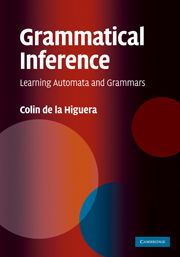Book contents
- Frontmatter
- Contents
- Preface
- Acknowledgements
- 1 Introduction
- 2 The data and some applications
- Part I The Tools
- Part II What Does Learning a Language Mean?
- Part III Learning Algorithms and Techniques
- 11 Text learners
- 12 Informed learners
- 13 Learning with queries
- 14 Artificial intelligence techniques
- 15 Learning context-free grammars
- 16 Learning probabilistic finite automata
- 17 Estimating the probabilities
- 18 Learning transducers
- 19 A very small conclusion
- References
- Index
12 - Informed learners
from Part III - Learning Algorithms and Techniques
Published online by Cambridge University Press: 05 July 2014
- Frontmatter
- Contents
- Preface
- Acknowledgements
- 1 Introduction
- 2 The data and some applications
- Part I The Tools
- Part II What Does Learning a Language Mean?
- Part III Learning Algorithms and Techniques
- 11 Text learners
- 12 Informed learners
- 13 Learning with queries
- 14 Artificial intelligence techniques
- 15 Learning context-free grammars
- 16 Learning probabilistic finite automata
- 17 Estimating the probabilities
- 18 Learning transducers
- 19 A very small conclusion
- References
- Index
Summary
Understanding is compression, comprehension is compression!
Greg Chaitin (Chaitin, 2007)Comprendo. Habla de un juego donde las reglas no sean la línea de salida, sino el punto de llegada ¿No?
Arturo Pérez-Reverte, el pintor de batallas‘Learning from an informant’ is the setting in which the data consists of labelled strings, each label indicating whether or not the string belongs to the target language.
Of all the issues which grammatical inference scientists have worked on, this is probably the one on which most energy has been spent over the years. Algorithms have been proposed, competitions have been launched, theoretical results have been given. On one hand, the problem has been proved to be on a par with mighty theoretical computer science questions arising from combinatorics, number theory and cryptography, and on the other hand cunning heuristics and techniques employing ideas from artificial intelligence and language theory have been devised.
There would be a point in presenting this theme with a special focus on the class of context-free grammars with a hope that the theory for the particular class of the finite automata would follow, but the history and the techniques tell us otherwise. The main focus is therefore going to be on the simpler yet sufficiently rich question of learning deterministic finite automata from positive and negative examples.
- Type
- Chapter
- Information
- Grammatical InferenceLearning Automata and Grammars, pp. 237 - 268Publisher: Cambridge University PressPrint publication year: 2010
- 2
- Cited by



